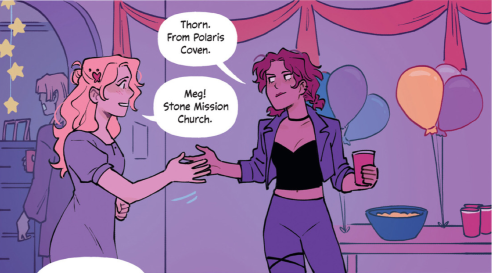Personal Note: As I’m sure you all noticed, my plans to return to my regular blogging schedule at the beginning of the month didn’t happen. What can i say? Oopsie. I guess the news from my electrophysiologist on 30 January impacted me a bit more than I expected. I’ll write a post about that later. But I did want to write this post about one of the books I’ve been reading.
One of the three books I’m currently reading1 is Shame-Sex Attraction: Survivors’ Stories of Conversion Therapy, edited by Lucas (Luke) Wilson.2 It’s a powerful book and one I can relate to heavily as someone who tried to “pray away the gay”3 for a few years myself. I also appreciate Luke’s4 introduction, in which he goes over the history of conversion therapy and what the research has determined about it’s efficacy and harm. Lots of footnotes with lots of citations.
The rest of the book consists of seventeen short essays from various survivors sharing an experience they had while going through conversion therapy or the impact going through it had on them. I’ve only read twelve of them so far, but they’ve each been stark and powerful. They should be a real eye-opener to anyone who is wondering what the “big deal” about conversion therapy really is.5
I want to take the rest of this post to highlight the story that I’ve found the most relatable so far. That’s the essay by Chris Csabs, which is titled “Into the Dark.” Chris was in a Christian band.6 In his essay, Chris relates an experience he had after his band played at a megachurch. I noticed two things about it. The first was the impact that something as simple as having a random guy hug him had on him. Chris wrote:
A momentary look of confusion flashed across his face before he nodded. “Of course, no problem! Bless ya, bro!” he replied cheerfully, bringing his long arms out in a bear-like hug, seemingly unaware of my discomfort. My heart instantly started beating faster.
I’m disgusting.7
Such a normal act created a great deal of inner turmoil in the form of guilt and shame, simply because trying to change his orientation forced him to question his motives and feelings at every turn. I remember having similar experiences and can echo Chris’s description of just how painful and difficult it can be.
The other thing that I noted was the depiction of how lonely Chris seemed to be. Despite the fact that he was traveling with fellow Christians and had just finished performing in front of a crowd, he felt isolated. Further, he felt like he had to isolate himself. In fact, he continued writing about that hug:
I returned the hug briefly, acutely aware in that moment that, because of my plan to become straight, this would probably be the most physical affection that I’d ever again have with another man. My heart ached, and I intentionally turned my attention to the view I had of the others, still mingling and laughing with the swelling group of other congregants.
I can relate to this, as I’ve written in the past about how the the ex-gay road is ultimately a solo journey no matter how many claim to support you:
The thing is, dealing with one’s feelings is ultimately something one has to do alone. No one can feel those feelings for you. No one can take them away from you. No one can do anything other than support you through it all, and no one can give that support 24/7. I found that late at night, laying in my bed, I was left all alone to either face my desire for love and intimacy with another man alone or repress it alone. It was my burden to carry, and the more I fought it, the heavier that burden got.
I encourage you to buy a copy of the book (or check it out at your local library) and read the rest of Chris’s story. And all the other survivors’ stories as well. Though in the interest of preparing people, I will note that some may find some of the stories disturbing or even triggering. Some of the stories include frank discussions of disturbing “therapies,” suicidal ideation, and even abuse at the hands of the person providing the “therapy.” However, I think this is important because it brings home just what a toxic and dangerous practice conversion therapy really is.
Post History: This post was written, proofread, revised, and finalized on 7 February 2025.
Footnotes
- What can I say? I’m an overachiever when it comes to reading? ↩︎
- Looking at the table of contents, I note that Luke also contributed an essay to the anthology. So he’s more than just the editor. (Insert a “Hairclub For Men” commercial parody here.) ↩︎
- I appreciate that the book includes stories from both people who tried “therapeutic” approaches to changing their sexuality and/or gender identity and religious ones. I think most of us who’ve gone through such things tend to use “ex-gay ministry” and conversion therapy” interchangeably. After all, while there are obvious differences in the two approaches, they’re trying to accomplish the same task and result in the same kinds of trauma and harm. Plus, as evidenced by at least some of the stories in the book, a lot of people resort to a combination of both approaches, further linking them. ↩︎
- I’ve chosen to refer to him in this post as “Luke” because that’s the name he goes by on social media and I’ve had a couple conversations with him there now. ↩︎
- Honestly, despite the fact that I tried going through an attempt (albeit self-directed) to change my sexual orientation, I found some of the stories shocking. And even those that didn’t surprise me still horrified me at times. ↩︎
- Chris doesn’t mention the name of the band and I’ve chosen not to attempt to see if i can hunt it down out of respect for that choice. ↩︎
- This line was italicized in the book, indicating it was the thought running through Chris’s mind at the time the incident occurred. Sadly, I have no way to distinguish this from the rest of the quote, so I figure I’d point it out in a footnote. ↩︎


